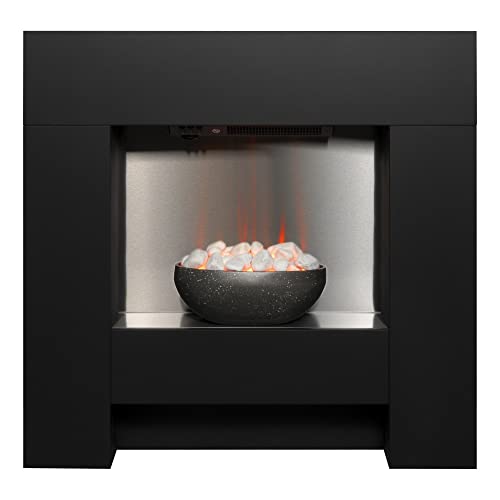What Is Best Fireplace' History? History Of Best Fireplace

The Best Fireplaces: A Comprehensive Guide for Homeowners
Fireplaces have actually long been a cherished function in homes, offering both warmth and a welcoming atmosphere. They are available in numerous styles, sizes, and fuel types, allowing property owners to select one that fits their individual visual and heating needs. This post digs into the best fireplaces, highlighting crucial functions and considerations to help you make an informed choice.
Kinds of Fireplaces
Comprehending the different types of fireplaces is crucial in choosing the very best alternative for your home. Below are the most commonly used fireplaces:
Wood-Burning Fireplaces
- Advantages: Traditional appeal, natural atmosphere, and effective heating.
- Downsides: Requires regular upkeep, ash disposal, and undergoes local guidelines relating to emissions.
Gas Fireplaces
- Benefits: Convenient, clean-burning, and simple to operate.
- Drawbacks: Requires a gas line, can be more pricey to set up at first.
Electric Fireplaces
- Advantages: Easy setup, low upkeep, and the safest choice for homes with kids or animals.
- Disadvantages: Lack the authentic feel of wood or gas flames, may not heat large areas efficiently.
Pellet Stoves
- Benefits: Eco-friendly, effective, and supply a constant heat output.
- Drawbacks: Requires electrical power to run, and pellet supply can be restricted in some areas.
Ethanol Fireplaces
- Benefits: No chimney required, portable, and eco-friendly.
- Drawbacks: Generally less efficient for heating.
A Comparison of Fireplace Types
| Type | Setup Cost | Running Cost | Heat Output | Maintenance | Environmental Impact |
|---|---|---|---|---|---|
| Wood-Burning | ₤ ₤ | ₤ | High | High | Moderate |
| Gas | ₤ ₤ ₤ | ₤ ₤ | Medium-High | Low | Moderate |
| Electric | ₤ | ₤ ₤ | Low | Really Low | Low |
| Pellet | ₤ ₤ | ₤ | Medium | Medium | Low |
| Ethanol | ₤ ₤ | ₤ ₤ ₤ | Low | Extremely Low | Extremely Low |
Top Considerations When Choosing a Fireplace
When you're in the marketplace for a new fireplace, keep the list below factors in mind to ensure you select the very best one for your home:
- Purpose and Functionality: What do you desire your fireplace to do? Is it for heating or aesthetic appeals? This will assist your option substantially.
- Space Availability: Measure the location where you wish to install the fireplace. Ensure the chosen type fits without overwhelming the area.
- Fuel Source: Assess the accessibility and expense of different fuel sources in your area to avoid unanticipated expenses.
- Setup Complexity: Some fireplaces might need significant changes to your existing home structure.
- Building Codes and Regulations: Be aware of local laws concerning ventilation, security, and emissions, as these can affect your fireplace choice.
- Visual Appeal: The design and design of a fireplace can serve as a centerpiece or enhance the existing design, so pick one that improves your home's general visual.
Advantages of a Fireplace
Including a fireplace to your home affords many benefits:
- Enhanced Aesthetic Appeal: A fireplace can elevate the design of any space, developing a cozy and welcoming environment.
- Increased Home Value: A well-installed fireplace can add considerable worth to your home, making it interesting potential purchasers.
- Energy Efficiency: Modern fireplaces, specifically gas and pellet stoves, can supply reliable heating while minimizing energy expenses.
- Emergency Heat Source: In cases of power failures, a wood or gas fireplace can work as a dependable heat source.
- Social Gathering Space: Fireplaces typically become the centerpiece for gatherings, promoting heat and comfort throughout friend or family' get-togethers.
Often Asked Questions (FAQs)
Q: How much does it cost to install a fireplace?A: Installation expenses can vary significantly based upon the type of fireplace, structural requirements, and labor expenses. Standard electric fireplaces might cost around ₤ 300, while custom-made wood or gas fireplaces can run from ₤ 3,000 to upwards of ₤ 10,000. simply click the up coming document : Are electric fireplaces safe?A: Yes, electric
fireplaces are normally safe.
They do not give off carbon monoxide and have no open flames. They frequently consist of safety functions like automatic shut-off systems. Q: How frequently should I have my chimney cleaned?A: If you use a wood-burning fireplace, it's suggested to have your chimney cleaned a minimum of as soon as a year
to prevent creosote accumulation, which can result in chimney fires. Q: Can I set up a gas fireplace myself?A: It's not suggested to install a gas fireplace without expert help due to the complexities associated with gas
lines, ventilation, and safety policies. Q: What are the best kinds of fuel for wood-burning fireplaces? Fireplace Suppliers UK : The best fuel choices consist of well-seasoned woods like oak, maple, or hickory, as they burn hotter and cleaner compared to softwoods. Selecting the best fireplace for your home
includes thinking about lots of factors, from looks to function and safety. Each kind of fireplace has its unique advantages and possible drawbacks.
Comprehending these aspects, in addition to your personal heating requirements and spending plan restraints, will direct you in making an informed choice. Eventually, a fireplace can offer not just heat however also a rich ambiance, transforming your home into a welcoming sanctuary.

